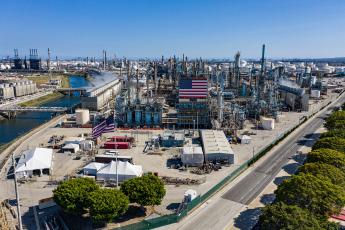AFPM launches broadcast, cable TV campaign spotlighting Virginia’s adoption of California vehicle mandates
WASHINGTON, D.C. – The American Fuel and Petrochemical Manufacturers (AFPM) today launched the first TV ad in its issue campaign to raise awareness and build support for repealing the 2021 law that requires Virginia to enact California’s electric vehicle mandates and bans on sales of new internal combustion engine vehicles.
Updated: Why California vehicle bans & Virginia policy matter to AFPM
You may have seen that AFPM is shining a spotlight on the Commonwealth of Virginia and its unlikely tie to California’s looming ban on gasoline and diesel vehicles. Allow us to explain why, and also to lay out the current state of vehicle mandates and bans in Virginia.
AFPM statement on NHTSA’s CAFE and fuel efficiency standards
WASHINGTON, Sept. 28, 2023—American Fuel & Petrochemical Manufacturers (AFPM) Senior Director of Fuels & Vehicle Policy Patrick Kelly today testified before the National Highway Traffic Safety Administration against its proposal on two vehicle groups that serves as a de facto ban on internal combustion engine vehicles.
AFPM applauds House passage of H.R. 1435 to protect consumers from higher costs of California vehicle bans
American Fuel & Petrochemical Manufacturers (AFPM) President and CEO Chet Thompson today applauded the bipartisan passage of H.R. 1435, the Preserving Choice in Vehicle Purchases Act, from the House of Representatives. Chet testified before the House Energy & Commerce Committee in favor of H.R. 1435 earlier this summer.
EPA’s new proposals to regulate pyrolysis oil will hurt America’s recycling future
Pyrolysis oil allows petrochemical manufacturers and recyclers to reduce the need for virgin petroleum-based feedstocks. Our industries cannot reap the benefits of advanced recycling without being able to take advantage of the substance’s broad uses, especially as a feedstock to make building blocks for new plastics.
AFPM: Reciprocal switching needed to address lack of freight rail competition & years of poor service
Today, Rob Benedict, AFPM Vice President of Petrochemicals and Midstream, issued the following statement in response to a unanimous proposal from the U.S. Surface Transportation Board that would allow for reciprocal switching within the U.S. freight rail system in order to address inadequate service.
EPA draft strategy to prevent plastic pollution needs revision
AFPM welcomes the Environmental Protection Agency’s (EPA’s) efforts in developing a Draft National Strategy to Prevent Plastic Pollution, but consistent with comments submitted to the Agency, we urge a revision of their strategy. To prevent plastic pollution, we encourage EPA to embrace policies that enable, not hinder, a circular economy for plastics where we use a range of technologies and strategies to recover post-consumer plastic and transform it back into usable materials.
AFPM statement on the expiration of the CFATS program
"AFPM is extremely disappointed that the Chemical Facility Anti-Terrorism Standards (CFATS) program was allowed to expire and strongly urges the Senate to pass H.R. 4470 as soon as possible so that our members can resume their longstanding, collaborative relationship with the Department of Homeland Security (DHS) via the CFATS program. Our industries remain committed to providing the best security possible while the program’s regulations remain unauthorized.."
AFPM statement and letter in support of House bills to stop government vehicle bans, attempts to electrify the RFS
“Just as we were proud to testify in support of these bills last month, AFPM is proud to support the legislation being marked up today...As members review these bills carefully, appreciating exactly what they do and do not do, the choice to support them should be obvious, especially for those with fuel and petrochemical manufacturing facilities in their districts.” – Chet Thompson, AFPM President & CEO








